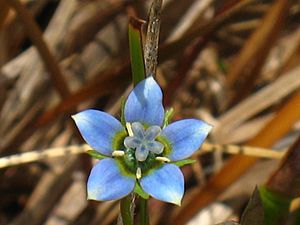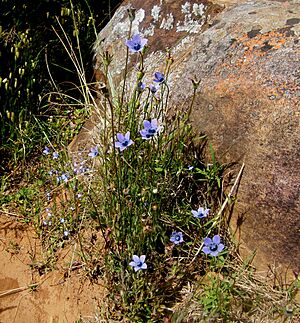Cape bluebell facts for kids
Quick facts for kids Cape bluebell |
|
|---|---|
 |
|
| Wahlenbergia capensis in the Kensington Bushland Reserve, Perth | |
| Scientific classification | |
| Genus: |
Wahlenbergia
|
| Species: |
capensis
|
| Synonyms | |
|
|
The Cape bluebell (scientific name: Wahlenbergia capensis) is a beautiful plant with bell-shaped flowers. It belongs to the bellflower family, Campanulaceae. This plant originally comes from South Africa, but it has also started growing in Australia. It's an annual plant, meaning it lives for only one growing season.
What Does the Cape Bluebell Look Like?
The Cape bluebell is an annual plant that grows from one to a few stems. It can reach a height of about 14 to 50 centimeters (6 to 20 inches).
Its lower leaves are shaped like an egg, while the leaves higher up are more like a spear. These leaves are usually between 9 and 40 millimeters (0.4 to 1.6 inches) long. Sometimes, their edges are a bit wavy or have small teeth.
The Flowers
Each Cape bluebell plant can have up to four flowers. These flowers are a lovely bluish-green color, often with dark blue centers and sometimes black spots.
The flowers have five triangular parts called sepals, which are about 4 to 7.5 millimeters long. The main part of the flower is bell-shaped near the bottom. It has five spreading, egg-shaped petals that are 6 to 11 millimeters long.
Inside the flower, there are five stamens, which are the parts that make pollen. The style (the part that receives pollen) is dark blue and has five branches at its tip. Cape bluebells usually bloom from September to December. After flowering, the plant produces a fruit that is a capsule, about 5 to 11 millimeters long.
Where Does the Cape Bluebell Grow?
The Cape bluebell is originally from South Africa. It grows widely in the Western Cape region, found between the towns of Clanwilliam and Knysna.
It was later introduced to Australia. In Australia, you can find it in the south-west part of Western Australia. It grows there between Kalbarri and Tambellup. The first time this plant was officially collected in Western Australia was in 1898.


